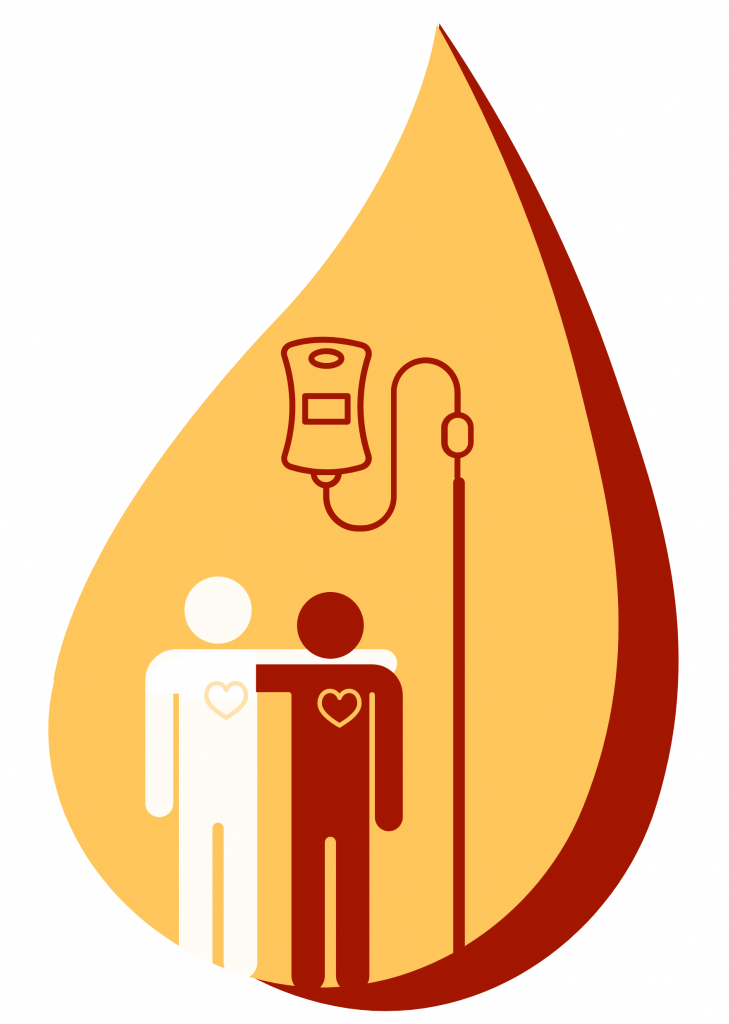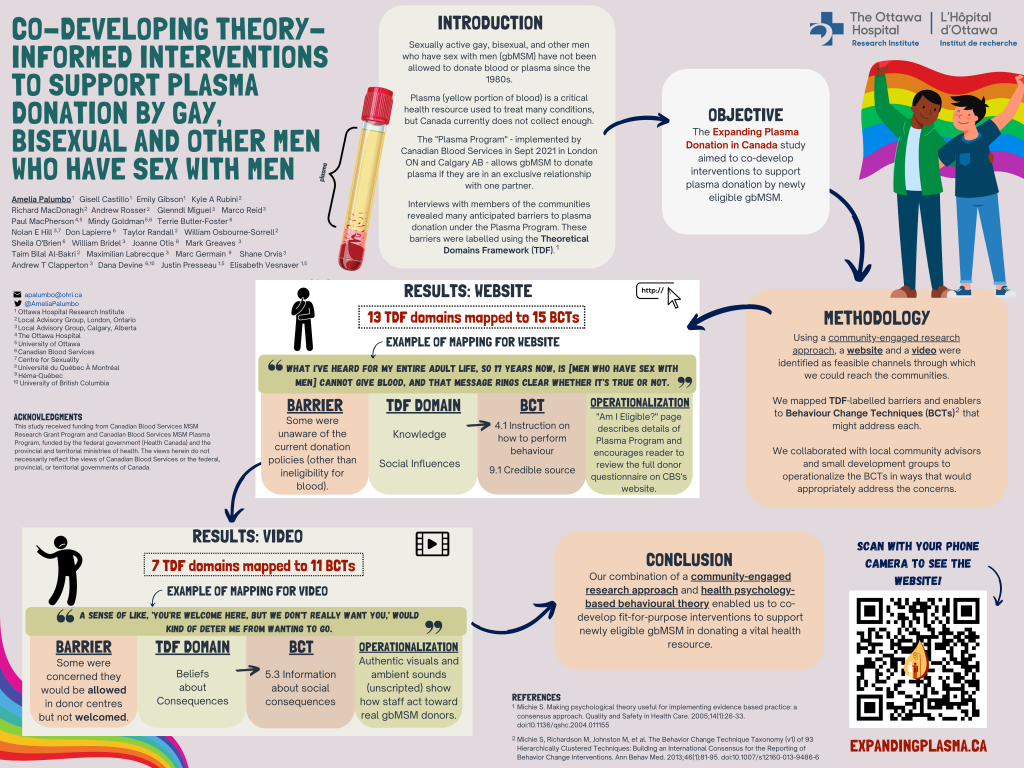Our Research
Our Research
What We Did
Originally our study started in London, ON, in 2019 and expanded to Calgary, AB in 2020. We used best practices from the fields of Implementation Science and Behavioural Medicine.
Our project focused on answering these questions:
- How acceptable are added screening questions to gbMSM and donor centre staff about sexual behaviour?
- What may help or hinder gbMSM from donating plasma?
- What may help or hinder donor centre staff from using the new questions to screen gbMSM for plasma donation?
- What strategies could address factors identified as helping/hindering staff when asking new screening questions? Which strategies are realistic, possible, and acceptable to both plasma donation clinic staff and to gbMSM?
To answer these questions, we interviewed and surveyed gay, bi and queer guys. We also interviewed donor centre staff.
We have a strong focus on working with gbMSM communities. We have two Local Advisory Groups (LAGs) consisting of gbMSM in London and Calgary. These folks provide monthly feedback and guidance on all aspects of the study.
The LAG groups have been an integral part of this work.
We used what we found interviews and surveys to then figure out how we could help newly eligible guys donate plasma. We formed two smaller development groups to work on creating interventions (you can see the research-y process we used to do this on the poster below). One group focused on a website (hi there! you’re reading it!) and the other focused on a video.
Check out a poster describing what we did in our research below.
You can click on it to download it as a PDF.
Portfolio
When we were looking for people to take part in our research, we created many advertisements and images for social media, posters and more. We’ve also created lots of infographics and other resources. For those interested in how we recruited men in the 2SGBTQ+ communities from London and Calgary, as well as those interested in the various infographics we’ve created to make the vast amount of information for this project more digestible, we present our portfolio. Please feel free to browse at your leisure!
What We Found
Interviews with Gay, Bi & Other Men Who Have Sex with Men
We interviewed 17 men in London and 10 men in Calgary who identified as gay, bisexual or as having sex with men (gbMSM). Right now we have just examined the interviews from London. In the coming months we’ll write more about what folks in Calgary had to say in this section of the website.
The folks we interviewed shared the following:
- They generally saw the pilot plasma program as acceptable, but only as a step towards better policies.
- Most saw the plasma pilot program as discriminatory because it only asks additional sexual activity screening questions of gbMSM even though HIV and other sexually transmitted infections affect straight populations too.
- Many felt that all donors should be screened using the additional screening involved in the plasma program (not just gbMSM).
- Some would not consider donating until they believed the policies were fair.
Many interviewees were keen to donate in the new program if they were eligible. However, even those who wanted to donate pointed out a number of things that made donating challenging (other than eligibility). This shows that while eligibility is important, being eligible on its own is likely not enough to encourage folks to donate as part of this new plasma program.
Some things that could stop people from donating were:
- Lost trust in the institutions that have upheld policies that ban gbMSM from donating because of the hurt these policies have had on individuals and communities
- A general lack of knowledge of plasma and its importance
- Concern that they would not being/feeling welcomed in the donor centre (even though they would be allowed to donate)
- Different screening only for gbMSM in this program would perpetuate an unwelcoming environment in the donor centre.
These findings shaped the recommendations we made to Canadian Blood Services when the pilot program was launched. We have also taken these thoughts, opinions and experiences into account when we created this website.
Surveys with Gay, Bi & Other Men Who Have Sex with Men
We received 247 responses to the survey from London and Calgary. We are still analyzing the responses we got from the surveys. When the analysis is finished, we will write a summary here.
If you would like to look at the survey questions, you can read through a PDF of the questions we asked in London and Calgary (they were slightly different).
Interviews with Donor Centre Staff
Very few studies have looked into the thoughts and beliefs of donor centre staff. We interviewed 28 donor centre staff (13 in London and 15 in Calgary). Our interviews focused on what would support or hinder staff in using the new screening questions for the pilot plasma program.
We broke down what staff had to say into three themes:
- Valuing inclusive criteria:
Staff supported rules that allow some sexually active gay, bi and other men who have sex with men to donate. Many believed the rules at the time were not inclusive enough and needed to change. When staff were told about the plans to change the rules, many were excited and believed it was a step in the right direction. However, some staff were concerned the new rules were not a big enough change. Many believed the new rules were still discriminatory because they required a different process for screening gbMSM. - Investing in donor experiences:
Staff wanted to help donors to have good experiences when they came to the donor centre. Some staff felt uneasy about using questions and rules that stigmatized gay, bi, and other men who have sex with men. Many worried that gbMSM donors might express anger and disappointment over the new rules and questions. Some staff were concerned that they did not have acceptable answers to possible questions from gbMSM donors (for example, “do you ask this question to all donors?”). The people we interviewed were also concerned that some staff may show their discomfort during screening and that this would have a harmful effect on staff-donor interactions. Further to this, some staff worried that existing donors may behave inappropriately with gbMSM donors (such as asking them about their identity). - Enabling education, training, and transparency:
Staff shared that providing in-person training and communicating changes to donors and the public would help staff do their job better. Staff said that their training should:- explain the scientific reasons behind the new criteria,
- help staff talk about and address their feelings of discomfort, and
- give staff an opportunity to practice using the new criteria and responding to donor questions.
Staff also believed that giving donors and the public enough information about the new criteria would help everyone understand and accept the changes. This includes what specific questions would be asked of gbMSM and why those questions are asked.
Our Recommendations
In October 2021, our team looked at what folks said in their interviews, and what would stop them from donating plasma. We developed recommendations for how to overcome these challenges. These recommendations were sent to the Manager responsible for the gbMSM plasma program at Canadian Blood Services.
Our Writing
Since we are based in an academic research institution, we have, of course, been working on publishing some of the results from our research in academic journals. You can check out our manuscripts using the links below.
Protocol Paper: A research protocol is a detailed plan of the study. You can check ours out in Health Research Policy and Systems.
Staff Paper: The results from interviews with staff. You can check it out in Transfusion.
Media
- Presseau J. Leading Change. 2019/05/13. Information/awareness. Radio Interview on Newstalk 1290 to discuss the study and promote the Aeolian Talk. General Public. Local. London, Canada.
- Presseau J. Rosser A. Leading Change. 2019/05/13. Information/awareness. Radio Interview by Craig Needles on Global News 980 CFPL to discuss the study and promote the Aeolian Talk. General Public. Local. London, Canada.
- Community Town Hall event at the Aeolian Hall Performing Arts Centre. “Aeolian Talks: Leading Change – The past, present and future of plasma donation by men who have sex with men”. Justin Presseau (lead investigator), Andrew Rosser (President of Pride London at the time) and other team members presented at the event. The purpose was to introduce the project to the London, Ontario community and to increase awareness about plasma donation 2019/05/13.
- Vesnaver E, Miguel G, Osbourne-Sorrell W. Expanding plasma donation to be more inclusive. 2021/10/12. Information/awareness. Interviews given to Canadian Blood Services for website article. Blood operator, general public. National. Available at: https://www.blood.ca/en/stories/expanding-plasma-donation-be-more-inclusive
- Miguel G, Vesnaver E. Canadian Blood Services eases restrictions for some gay men in Alta., Ont. 2021/10/12. Information/awareness: Article on CTV News website from Canadian Blood Services press release regarding launch of plasma program in London and Calgary. General public. National. Available at: https://www.ctvnews.ca/health/canadian-blood-services-eases-restrictions-for-some-gay-men-in-alta-ont-1.5620509
- Our research was referred to in a CBC news article covering Canadian Blood Services’ press release about the launch of the gbMSM plasma program. 2021/10/13. Available at: https://www.cbc.ca/news/canada/london/canadian-blood-services-gay-men-donate-1.6208944
- Terrie Foster, our nurse collaborator from the London Donor Centre was interviewed live on CBC National Radio about the launch of the plasma program for gay and bisexual men in London and Calgary. 2021/10/13. Available at: https://www.cbc.ca/player/play/1961515587698
- Elisabeth Vesnaver, our postdoctoral fellow and practical lead of the project was interviewed live on CBC Radio Calgary about the changes to the plasma donation criteria for gay and bisexual men. 2021/10/14. https://www.cbc.ca/listen/live-radio/1-5-calgary-eyeopener/clip/15872087-changes-plasma-donation
- Miguel G, Hill NE. Calls for full removal of ban on blood donations from gay and bisexual men. 2021/10/15. Information/awareness: interview with LAG members regarding launch of plasma program (no direct mention of study). General public. National. Available at: https://globalnews.ca/video/8270688/calls-for-full-removal-of-ban-on-blood-donations-from-gay-and-bisexual-men
- Vesnaver E. Changes to blood and plasma donation for gay and bisexual men. 2021/10/15. Information/awareness: Interview with CTV News Television. General public. National. Available at: https://toronto.ctvnews.ca/video?playlistId=1.5624873
- Vesnaver E. Canadian Blood Services eyes removing sexual orientation-based donation restrictions. 2021/10/22. Information/awareness. Canadian Press. General public. National.Published on: Globe and Mail news website. Available at: https://www.theglobeandmail.com/canada/article-canadian-blood-services-eyes-removing-sexual-orientation-based/
Acknowledgement of Funding
This research received funding support from Canadian Blood Services MSM Research Program, funded by the federal government (Health Canada) and the provincial and territorial ministries of health. The views herein do not necessarily reflect the views of Canadian Blood Services or the federal, provincial, or territorial governments of Canada. This website has been developed for a research project funded by the Canadian Blood Services MSM (i.e., men who have sex with men) research grant. This project and the others that were also funded were created to develop the evidence needed to progress the policy (see more info here).

